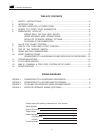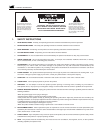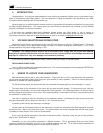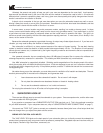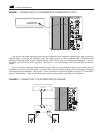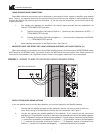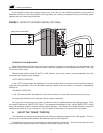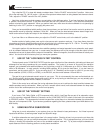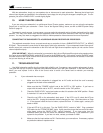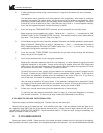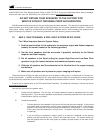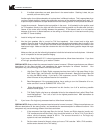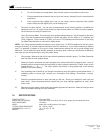
3. Turn off all limiters and compressors, auto azimuth controls, auto balance controls, etc.
4. If the processor/receiver/receiver has an input level control, calibrate it per the manufacturer’s
instructions.
5. If the component has a digital input, and you are using a source component with a digital
output, always use the digital input, not the analog input.
H. Set levels for each channel. You can take a measurement at the listening position to establish the
reference level, but it is usually more accurate to take levels at about one meter from each speaker.
Set all channels to exactly the same level.
Use a Sound Level Meter. Point it directly at the speaker being measured. Set all channels to the same
level, using the processor/receiver/receiver’s internal test signal. Set the meter to “C” weighting and
“Slow” response. Set the levels to 75 dB if you have a THX processor/receiver/receiver or are using
the Video Essentials disc as a source for setting levels.
NOTE: If you using identical speakers anywhere in your system (e.g., S-150THX speakers for the left, center,
and right channels), all of those channels should be set to the same level. If your meter measures a different
level, it is probably a limitation of this type of meter measurement method and not an actual audible level
difference. Set the channels using identical speakers to the same level, unless you actually hear a difference
later when you are doing listening to verify the system setup.
I. Check phase. Make sure that all five main channel speakers are wired in phase. The Video Essentials
disc has tests for main speaker phase.
J. Make sure that the subwoofer and main speakers are in phase at the 80 Hz crossover point. Listen to
something with a consistent bass line around 80 Hz while a partner switches the “Phase” control on the
subwoofer from ( + ) to ( — ). The switch position that results in the greatest bass at the listening
position is the correct setting.
K. Play something that is familiar to you through the system to verify the system’s overall performance. If
something does no sound right, recheck your connections and settings. Re-measure, re-check,
re-align.
L. Switch the processor/receiver to each input that you will use. Check your settings for each input and
each mode. Some processor/receivers require that you enter settings separately for each mode
and/or input.
M. Before playing the system, check levels and speaker alignment one last time. Make sure that you write
down all processor settings for future reference.
14. SPECIFICATIONS
POWER OUTPUT: 250 watts RMS
AMPLIFIER DISTORTION: Less than 0.03% from 20 to 125 Hz at full output into the subwoofer driver
INPUT IMPEDANCE: 15 Kohms
NOISE: better than -90 dB relative to full output
TYPICAL ROOM RESPONSE: 20 - 125 Hz ± 3 dB
DIMENSIONS (H x W x D): 18" x 15 3/8" x 21 7/8"
WEIGHT: 52 lbs.
POWERED SUBWOOFER
14
VX-1250 subwoofer manual
11/23/04 pt/qrk
PN # 70111




